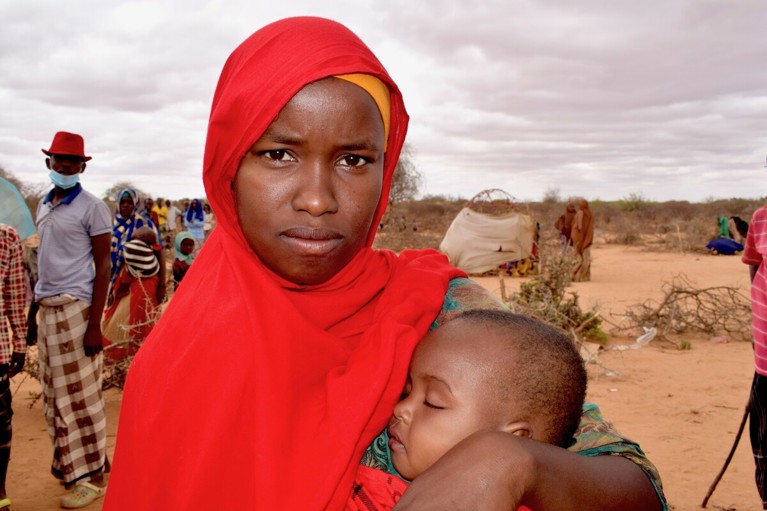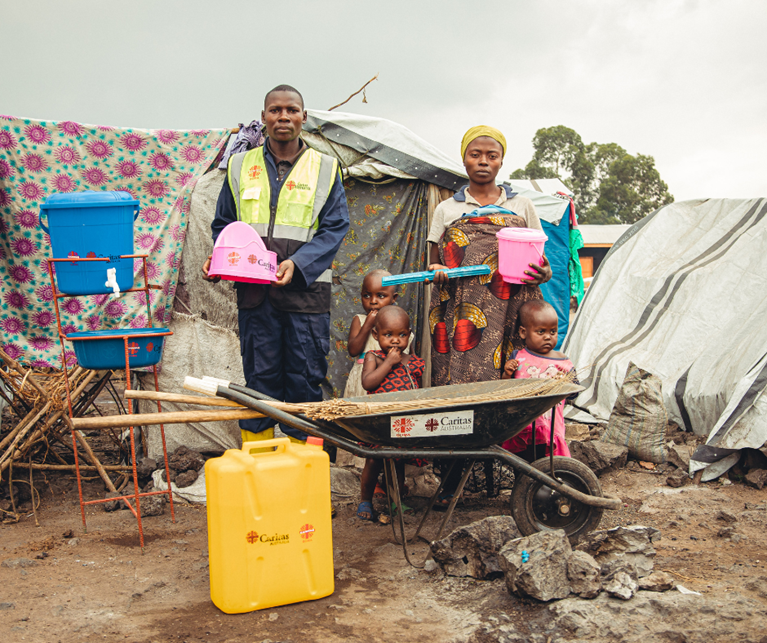Refugees and Displaced People
Over 120 million people have been forced from their homes worldwide. Give now to help deliver urgently needed humanitarian aid.
Donate now
120 million people
have been forced to flee their homes worldwide
43 million people
have crossed international borders
40% are children
aged under 18 years
2 million children
were born as refugees in 2018-2022

Our partners are on the ground providing vulnerable communities with:
WASH programs
clean drinking water, sanitation and hygiene
Emergency shelter
reducing risks for vulnerable families
Medical support
access to basic family medicines and sanitation can help prevent the spread of disease
Psychosocial support
critical in helping displaced people recover from the experience of trauma
Where in the world is Caritas Australia helping displaced people and refugees?
We're working with on the ground partners around the world to bring immediate and long-term humanitarian assistance to people fleeing conflict, violence, global crises and the impacts of climate change. Some of the places we are currently actively supporting displaced people:
Africa
As conflict and the food crisis force people from their homes across Africa, we are working with our partners on the ground in countries like Sudan, South Sudan, Ethiopia and Democratic Republic of the Congo.
Ukraine
3.7 million people displaced within Ukraine, and 6.5 million people displaced to other countries. We are working with our partners to provide shelter, food, water, medicine and other urgent support.
Bangladesh
Over 1 million Rohingya refugees fleeing Myanmar are sheltering in the world's largest refugee camp in Cox's Bazar. We are working with our partner Caritas Bangladesh to provide safe drinking water, sanitation and hygiene support.
Stories from the global refugee and displaced people crisis

Cox's Bazar, Bangladesh
Over 1 million refugees, mainly Rohingya fleeing persecution in Myanmar, live in the Kutupalong camp. Conditions are poor, and the people live in limbo - unable to live freely in Bangladesh, and unable to return to safety in Myanmar.
On May 24th a devastating fire broke out leaving 1,300 people without shelter and destroying the Caritas Bangladesh warehouse that contained shelter materials worth millions. Fires are unfortunately common in camps like Cox’s Bazar, as people typically cook on open stoves in small shelters made of combustible materials.

Marian’s story, Somalia
Marian's livelihood has been decimated after four years of drought caused by climate change.
“We had no food or water because of the drought,” she says. “Our crops failed and our goats died. Our livelihoods are gone. We were hungry and desperate.”
Like so many others, she left her home because she had no other options. She walked across Somalia with her eight-month-old daughter to get to Gedo in southern Somalia, hoping to find more food and water, or at least humanitarian aid.
“We walked for five days and nights with little food or water to get here,” she says. “We have been here for several weeks, maybe even a month, and still have not been properly registered with the authorities.”

Sibomana's Story - Democratic Republic of Congo
Sibomana is 34 years old and a married father of six children. War forced his family to flee their home in August 2022.. Since then, they have been living in a camp for Internally Displaced Peoples (IDPs), in the province of North Kivu. A native of the Kisigari sub-chiefdom in Rutshuru territory, "Sibo" as his relatives call him, was chosen as a hygiene promoter because of his leadership skills and knowledge of community mobilization. Hygiene promoters organize community awareness sessions, and disinfect public toilets and households exposed to the risk of cholera.
As one of 51 members of the hygiene committee (80% of whom are IDPs), he has been equipped, supported, and accompanied by Caritas Goma in implementing hygiene and sanitation measures in various IDP camps and sites.
As part of this work, Sibomana earns a bonus at the end of each week, which allows him to support the needs of his family.

Illyena's story, Ukraine
23-year-old Ilyena, her husband Andrei and their 9-month-old son Bagdan, decided to flee Kharkiv. After sheltering in a crowded metro station, they walked for hours through dark metro tunnels until they reached their car. It took them six days to drive to the Polish border. After they crossed, volunteers from Caritas Poland helped Illyena access a sheltered room for mothers and children, where she can access the necessities she needs to care for Bagdan. Andrej had to stay behind as most Ukrainian men aged 18 to 60 cannot leave the country.

9 million forced from their homes, Sudan
Sudan has been suffering from protracted fighting for over a year. The violence has spread across the country and led to millions of people being forced from their homes, along with thousands of injuries and deaths.
Sudan has traditionally hosted for refugees from neighbouring countries. Important aid work has been happening in refugee camps for many years with limited resources. The conflict has put pressure on these already scarce resources, resulting in many people facing a lack of water, sanitation, food, shelter and safety.
Latest news
A visit to the world's largest refugee camp in Bangladesh
Aurora and Mark from the content and communication teams visited Bangladesh in May for a content collection trip. Trips like these are a vital way for us to share stories from the field with our generous community of supporters.
World Refugee Week: Caritas Australia raises awareness of the world’s largest refugee camp
This week Caritas Australia is shining a light on the plight of the one million people in the world’s largest refugee camp, Kutupalong in Cox’s Bazar, Bangladesh, which is made up of 33 highly congested camps. The Rohingya Emergency in 2017 caused hundreds of thousands to flee there, with the plight of an estimated half a million child refugees having captured global attention.
Caritas Australia welcomes a $31m government investment into Ukraine aid
The Australian Government has announced that it will provide a further $31m of assistance to help meet Ukraine’s energy and humanitarian needs. Funding will be split between the provision of heat and electricity to Ukrainians, supporting the UN as it coordinates supplying essentials such as food, shelter and water, and a UN partnership focused on supporting persons with disabilities.
Donate now
Where the funds go
78% of funds are spent on implementing Local and International Programs, including important education and advocacy in Australia to amplify the voice of our partners.
15% of funds are spent on Fundraising, so that we can maintain and expand the scope of our humanitarian and development partnerships and work across the globe.
7% of funds are spent on infrastructure, systems and people that make the work we do possible.

Other emergencies
Ukraine War
17.6 million people are in need of urgent humanitarian assistance, as we pass the 2-year anniversary of the invasion.
Gaza War
Over 35,000 people have been killed, the majority of them women and children. All 2.2 million people in Gaza do not have enough food, with 1 million on the brink of starvation and famine.
Sudan Crisis
25 million people are in need of humanitarian assistance as violence spreads across the country. 9 million people have been displaced and the country teeters on the edge of famine.
Where does my donation go?
The funds you donate to this appeal go to Caritas Australia’s Emergency Response Fund and will be used to provide humanitarian assistance to communities affected by this crisis. Should circumstances prevent us from delivering aid to this emergency, or if excess funds remain after the crisis, donations will be directed to other emergencies where Caritas has humanitarian operations.
As a member of the Australian Council for International Development (ACFID), Caritas Australia is committed and fully adhere to the ACFID Code of Conduct, conducting our work with transparency, accountability and integrity. Find out more about ACFID Code of Conduct for Emergency Appeals.